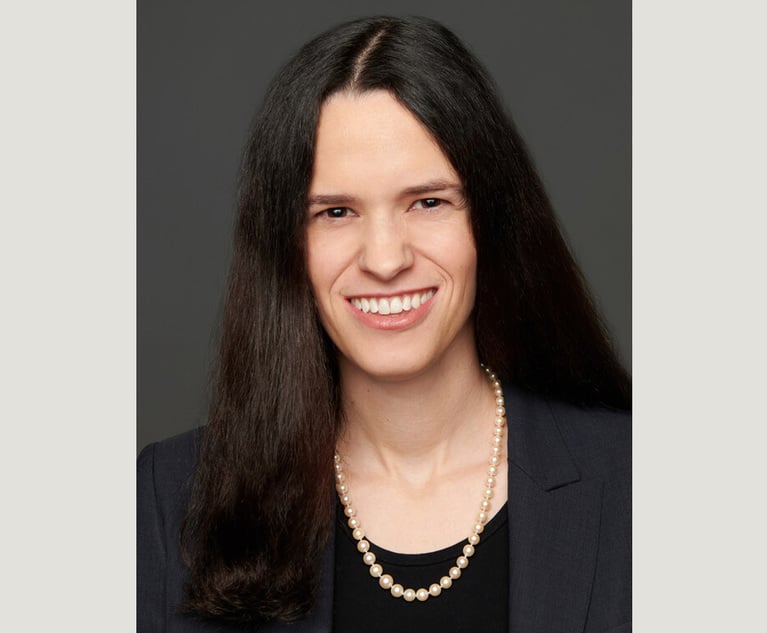DOJ Wants to Show Jury Roger Stone Is a Bigger Liar Than He's Charged With Being
The government wants to show that Stone "did not come in like a surgeon, trying to lie about one specific question."
September 25, 2019 at 02:36 PM
5 minute read
 Amy Berman Jackson, 2010. Photo by Diego M. Radzinschi/ALM
Amy Berman Jackson, 2010. Photo by Diego M. Radzinschi/ALM
Federal prosecutors want to prove that Roger Stone is a liar—and not just about his contacts with WikiLeaks.
During a pretrial hearing in federal court Wednesday, attorneys with the U.S. Attorney's Office for D.C. urged U.S. District Judge Amy Berman Jackson of the District of Columbia to allow them to argue before a jury that Stone wanted to obstruct the House Intelligence Committee's Russia investigation with not just the false statements he's charged with making, but through other alleged lies too.
They honed in on Stone's response to a question about whether he had been in touch with the Trump campaign over a political action committee Stone started in support of the then-candidate, saying the longtime GOP operative lied when he told the committee he hadn't.
"The government's position is he went in with the intent to lie. Not only lie about his communications with WikiLeaks, but also as to any other matter," said Michael Marando, an assistant attorney general.
Marando said that pertained to Stone's contacts with the Trump campaign, alleging that Stone "went in with a clear plan to lie, to separate himself from the campaign, in order to shield the lies about his connections to WikiLeaks."
And he said that federal prosecutors have "voluminous evidence" showing Stone was in "communication with the highest levels of the campaign," about the PAC, just short of candidate Trump himself.
Jackson seemed wary of allowing the evidence to come into court, raising concerns that it would add time to the trial in order to prove an allegation that Stone wasn't charged with.
But Marando argued the government wants to show that Stone "did not come in like a surgeon, trying to lie about one specific question."
"He went in with a mindset, your honor. And his mindset was, 'I'm going to obstruct this investigation,'" Marando said.
Stone's Fort Lauderdale-based attorney Bruce Rogow said the evidence should not be admitted into court. He argued that doing so would open the door as to whether Stone violated campaign finance laws, and that contact with the campaign did not fall under the scope of the House Intelligence Committee's Russia probe Stone was testifying in.
While Jackson did not rule on the matter, she made it clear that she was not buying Stone's defense that he may have been "mistaken" in answering some questions before the committee.
"I'm not persuaded by one of the arguments the defense made, that the answer was unclear," Jackson said. "I think 'no' is about as clear of a 'no' a person can give."
She also took a swipe at Stone's and Rogow's frequent efforts to bring up whether Stone's rights to free speech are being put on trial.
"Once again, this trial is not going to be about the First Amendment," Jackson said, "despite his dogged efforts to turn it into a discussion of that topic."
Jackson also rejected Stone's efforts to include evidence on Russian election interference in the trial. She sided with the government's assertions that Stone will largely be on trial for allegedly lying to Congress, and not on hacking charges.
"This was an investigation," she said, noting that Stone's allegedly false statements stopped the House from being thorough in following other lines of investigation and obtaining materials that Stone claimed in his testimony didn't exist.
And she wasn't happy about Rogow's insinuation that he may raise questions about former special counsel Robert Mueller's investigation in questioning potential witnesses, like Jerome Corsi or former White House strategist Steve Bannon.
"We're not going to try the investigators here, or the investigation," Jackson said.
But Rogow said he may have to do so when pressing certain witnesses like Corsi, who has said he was offered a plea deal by Mueller, about the circumstances of such agreements.
Jackson did not rule on the issue, but said she wants to avoid "having heated arguments in front of the jury or long bench conferences" if she believes some of Rogow's questions are out of line.
Jackson also ruled on some of the government's list of proposed exhibits. The judge left it up to attorneys for the government and Stone to figure out a deal regarding whether a clip of "The Godfather: Part II" should be shown to the jury.
She stumbled over the pronunciation of the fictional character Frank Pentangeli, who Stone allegedly referenced while attempting to convince expected trial witness Randy Credico to not testify before the House committee.
Jackson also took issue with another government exhibit showing Stone's phone contacts with members of the Trump campaign, including the president. Stone's lawyers had objected to the use of the chart, arguing that it didn't tell the full picture of his contacts with the campaign.
While she said it could be used in trial, Jackson said she found the color choices on the chart too confusing to follow along.
"There should be three clearly different colors," she instructed the Justice Department lawyers. "A light blue, a red or something else. Something you can tell is not blue."
This content has been archived. It is available through our partners, LexisNexis® and Bloomberg Law.
To view this content, please continue to their sites.
Not a Lexis Subscriber?
Subscribe Now
Not a Bloomberg Law Subscriber?
Subscribe Now
NOT FOR REPRINT
© 2025 ALM Global, LLC, All Rights Reserved. Request academic re-use from www.copyright.com. All other uses, submit a request to [email protected]. For more information visit Asset & Logo Licensing.
You Might Like
View All
In-House Moves of the Month: Boeing Loses Another Lawyer, HubSpot Legal Chief Out After 2 Years
5 minute read
After Regime Change, Syria Remains Liable in US Federal Courts for Alleged Assad-Era Terrorism Support
3 minute read

Split 4th Circuit Ruling Is a Win for Covington & Burling in US Army Base Attack Litigation
3 minute readTrending Stories
- 15th Circuit Considers Challenge to Louisiana's Ten Commandments Law
- 2Crocs Accused of Padding Revenue With Channel-Stuffing HEYDUDE Shoes
- 3E-discovery Practitioners Are Racing to Adapt to Social Media’s Evolving Landscape
- 4The Law Firm Disrupted: For Office Policies, Big Law Has Its Ear to the Market, Not to Trump
- 5FTC Finalizes Child Online Privacy Rule Updates, But Ferguson Eyes Further Changes
Who Got The Work
J. Brugh Lower of Gibbons has entered an appearance for industrial equipment supplier Devco Corporation in a pending trademark infringement lawsuit. The suit, accusing the defendant of selling knock-off Graco products, was filed Dec. 18 in New Jersey District Court by Rivkin Radler on behalf of Graco Inc. and Graco Minnesota. The case, assigned to U.S. District Judge Zahid N. Quraishi, is 3:24-cv-11294, Graco Inc. et al v. Devco Corporation.
Who Got The Work
Rebecca Maller-Stein and Kent A. Yalowitz of Arnold & Porter Kaye Scholer have entered their appearances for Hanaco Venture Capital and its executives, Lior Prosor and David Frankel, in a pending securities lawsuit. The action, filed on Dec. 24 in New York Southern District Court by Zell, Aron & Co. on behalf of Goldeneye Advisors, accuses the defendants of negligently and fraudulently managing the plaintiff's $1 million investment. The case, assigned to U.S. District Judge Vernon S. Broderick, is 1:24-cv-09918, Goldeneye Advisors, LLC v. Hanaco Venture Capital, Ltd. et al.
Who Got The Work
Attorneys from A&O Shearman has stepped in as defense counsel for Toronto-Dominion Bank and other defendants in a pending securities class action. The suit, filed Dec. 11 in New York Southern District Court by Bleichmar Fonti & Auld, accuses the defendants of concealing the bank's 'pervasive' deficiencies in regards to its compliance with the Bank Secrecy Act and the quality of its anti-money laundering controls. The case, assigned to U.S. District Judge Arun Subramanian, is 1:24-cv-09445, Gonzalez v. The Toronto-Dominion Bank et al.
Who Got The Work
Crown Castle International, a Pennsylvania company providing shared communications infrastructure, has turned to Luke D. Wolf of Gordon Rees Scully Mansukhani to fend off a pending breach-of-contract lawsuit. The court action, filed Nov. 25 in Michigan Eastern District Court by Hooper Hathaway PC on behalf of The Town Residences LLC, accuses Crown Castle of failing to transfer approximately $30,000 in utility payments from T-Mobile in breach of a roof-top lease and assignment agreement. The case, assigned to U.S. District Judge Susan K. Declercq, is 2:24-cv-13131, The Town Residences LLC v. T-Mobile US, Inc. et al.
Who Got The Work
Wilfred P. Coronato and Daniel M. Schwartz of McCarter & English have stepped in as defense counsel to Electrolux Home Products Inc. in a pending product liability lawsuit. The court action, filed Nov. 26 in New York Eastern District Court by Poulos Lopiccolo PC and Nagel Rice LLP on behalf of David Stern, alleges that the defendant's refrigerators’ drawers and shelving repeatedly break and fall apart within months after purchase. The case, assigned to U.S. District Judge Joan M. Azrack, is 2:24-cv-08204, Stern v. Electrolux Home Products, Inc.
Featured Firms
Law Offices of Gary Martin Hays & Associates, P.C.
(470) 294-1674
Law Offices of Mark E. Salomone
(857) 444-6468
Smith & Hassler
(713) 739-1250










